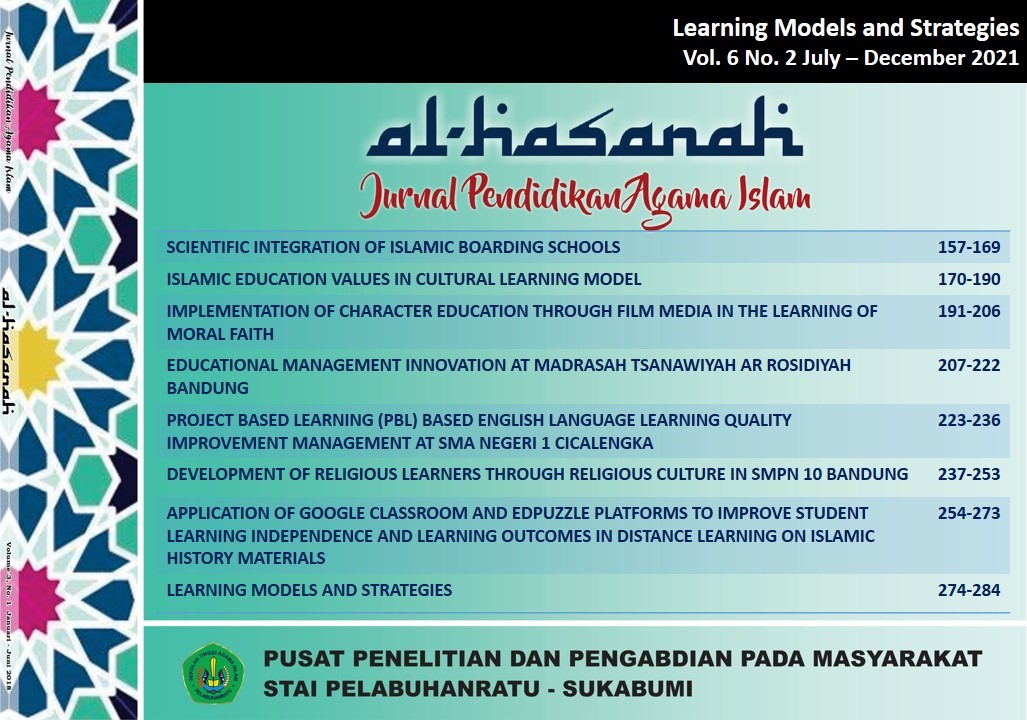MANAJEMEN PENINGKATAN MUTU PEMBELAJARAN BAHASA INGGRIS BERBASIS PROJECT BASED LEARNING (PBL) DI SMA NEGERI 1 CICALENGKA
DOI:
https://doi.org/10.51729/6241Keywords:
Management, Learning Quality, PBLAbstract
Behind this research is the problem of the English learning process in improving the quality of learners (Case Study On Speaking at Sma Negeri 1 Cicalengka and Sma Negeri Cikancung Bandung Regency) the english learning process has tended to be centered on teachers, generally teachers convey learning in the classroom with conventional methods and based on the results of interviews with English teachers aspects of Speaking Skill do not reach the Criteria of Completion so far. It has no effect on the quality of English learning. English learning is inseparable from the role of learning management where teachers plan, implement and evaluate various actions carried out in carrying out learning activities including utilizing various media and learning methods that make it easier for students to achieve learning goals, especially learning English on speaking aspects. To overcome this, what teachers can do is prepare learning by applying learning management. The aim of this study is to find out about learning planning using Project Learning methods in improving the speaking aspect recommending that the Project Learning method can be one of the preferred learning methods and apply it to improve students' English speaking
Downloads
References
Amaliah. (2020). Implementation Of Edpuzzle to Improve Students Analytical Thinking Skill in Narrative Text. Jurnal Prosidi, 14(1), 35–44.
Basri, H., & Saebani, B. A. (2010). Ilmu pendidikan Islam. Bandung: Pustaka Setia.
Budiarto, I. D. (2020). Penggunaan Startegi Pembelajaran Filpped Classroom secara Daring Berbantuan Media Edpuzzle untuk Meningkatkan Pemahaman Materi Hukum Dasar Kimia Siswa Kelas X. Prosiding Seminar Nasional Kimia (SNK) 2020, 110. Surabaya: Jurusan Kimia FMIPA Universitas Negeri Surabaya.
Creswel, J. W. (2014). Research Design: Pendekatan Kualitatif, Kuantitatif, dan Mixed. Yogyakarta: Pustaka Pelajar.
Hergenhahn, B. R., & Olson, M. (2008). Theories of Learning. Jakarta: Kencana Prenada Media Group.
Hikmawati, F. (2019). Metodologi Penelitian. Depok: PT RajaGrafindo Persada.
Margono. (1997). Metodologi Penelitian Pendidikan. Jakarta: Rineka Cipta.
Matlin, M. W. (2009). Cognitive Psychology. Denver: John Wiley & Sons.
Moleong, L. J. (2017). Metodologi Penelitian Kualitatif. Jakarta: PT Remaja Rosdakarya.
Nurmila, N. (2020). Paradigma Positivisme dan Postpositivisme. Bandung.
Schunk, D. H. (2012). Learning Theories. Yogyakarta: Pustaka Pelajar.
Sukmadinata, N. S. (2012). Metode Penelitian Pendidikan. Bandung: PT Remaja Rosdakarya.
Syah, M. (1995). Psikologi Pendidikan Suatu Pendekatan Baru. Bandung: PT Remaja Rosdakarya.
Uno, H. B. (2009). Model Pembelajaran: Menciptakan Pro Ahmad, A dan A . Rohani. 1995. Pengelolaan Pengajaran. Jakarta : Jakarta : Rineka Cipta.
Ambarita, Alben. 2006. Manajemen Pembelajaran. Jakarta: Departemen Pendidikan Nasional.
Arikunto, 2006. Dasar - Dasar Evaluasi Pendidikan. Jakarta : PT Rineka Cipta.
______,__ 2008. Penelitian Tindakan Kelas. Jakarta : Bumi Aksara.
Ausubel David P., Joseph D. Novak, and Helen Hanesian. 1978 . Educational Psychology, New York : Halt, Renehart and Winson.
Barlian, Ujang Cepi.2016. Manajemen Strategi Konsep dan Implementasi.Bandung: Khalifa Insan Press.
Bruner, Jerome S., 1973. The Relevance of Education. New York : The Norton Library.
Brown, Doguglas H. 2004. Language Assessment : Principles and Classroom Practices. New York : Pearson Education.
__________________. 2001. Teaching by Principles. New York : Addition Wesley Longman.
Darwan Wawan. 2017. Tsesis Model Pembelajaran Karakter di Lingkungan Sekolah Berbasi Budaya.
Dimyati dan Mudjiono. 1999. Belajar dan Pembelajaran. Jakarta : Rineka Cipta, h. 250-251.
Diningsih, Nining. 2020. Manajemen Berbasis Sekolah. Sumedang/Bandung: Alqaprint Jatinangor.
Johnson, Elaine B. 2009. Contextual teaching and learning: menjadikan kegiatan belajar mengajar mengasyikan dan bermakna. Bandung: Mizan Learning
Center.
Moleong, Lexy. J. 2004. Metode Penelitian Kualitatif. Bandung : Bandung: Remaja Rosdakarya.
_____________. 2011. Metodologi Penelitian Kualitatif Edisi Revisi: Bandung : Remaja Rosdakarya.
Nur, Agustiar Syah.2001. Perbandingan Sistem Pendidikan 15 Negara. Edisi Pertama. Bandung: Lubuk Agung.
Sanjaya, Wina. 2007. Strategi Pembelajaran Berorientasi Standar Proses Pendidikan. Jakarta: Kencana Prenada Media Group.
Sugiyono. 2012. Metode Penelitian Kuantitatif Kualitatif dan R&B. Bandung: Alfabeta.
Sa’ud, Udin Syaefudin dan Abin Syamsudin. 2018. Perencanaan Pendidikan Suatu Pendekataan Komprehensif. Bandung : Remaja Rosdakarya.
Nurhayati Tesna. 2018. Tesis Manajemen Model Problem Instruction untuk Meningkatkan mutu Pembelajaran.
Winarni, Hj. Wiwin. 2009. Disertasi Model Manajemen Sekolah Unggulan.
Jurnal :
Diningsih, Nining dkk.2018. Jurnal Peteka. Aqaprint Jatinangor.
Rizki, Wa ode Tika Jurnal. Jurnal Peningkatan Kemampuan Berbicara dalam Bahasa Inggris Melalui Storytelling Pada Siswa SMK Negeri 3 Kota Sorong.
Dokumen:
Permendiknas. No. 41 Tahun 2007. Tentang Standar Proses
Permendiknas. No. 20 Tahun 2007. Tentang Standar Penilaian
Permendiknas. No. 19 Tahun 2007. Tentang Standar Pengelolaan Pendidikan
Undang - Undang RI. No. 20 Tahun 2003. Tentang Standar Sistem Pendidikan Nasional
Undang-Undang RI.. No. 14 Tahun 2005. Tentang Guru dan Dosen Undang -Undang RI. No.19 Tahun 2005. Tentang Standar Pendidikan Nasional.ses Belajar Mengajar yang Kreatif dan Efektif. Jakarta: Bumi Aksara.
Uys, W. F., & Chigona, W. (2020). Evaluating Undergraduate Studens’ Self Directed Learning Experiences During Research-Based Learning’. in E. Mentz & R. Bailey (eds), Self-directed learning research and its impact on educational practice (Vol. 3; E. Mentz & R. Bailey, eds.). Retrieved from https://books.aosis.co.za/index.php/ob/catalog/book/206

Additional Files
Published
How to Cite
Issue
Section
License

This work is licensed under a Creative Commons Attribution-ShareAlike 4.0 International License.
Authors who publish with this journal agree to the following terms:
- Authors retain copyright and grant the journal right of first publication with the work simultaneously licensed under a Creative Commons Attribution 4.0 International License. that allows others to share the work with an acknowledgement of the work's authorship and initial publication in this journal.
- Authors are able to enter into separate, additional contractual arrangements for the non-exclusive distribution of the journal's published version of the work (e.g., post it to an institutional repository or publish it in a book), with an acknowledgement of its initial publication in this journal.
- Authors are permitted and encouraged to post their work online (e.g., in institutional repositories or on their website) prior to and during the submission process, as it can lead to productive exchanges, as well as earlier and greater citation of published work.



















